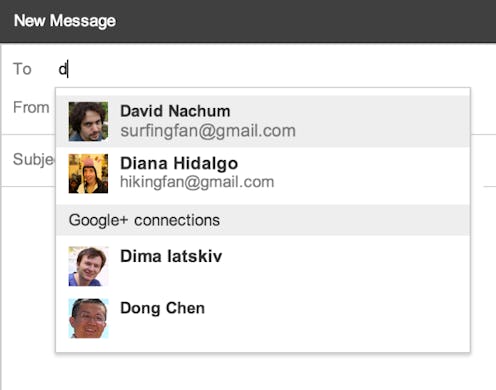News
Your Gmail Privacy Just Changed

Gmail users who like to keep their email addresses under wraps might not be too crazy about Google's latest tweak to the email surface. Now, anyone with a Gmail account can email any other user with a Google+ account — regardless of whether or not the recipient has shared their email address with the sender. Some people have concerns about it being an infringement of privacy, while Google says the change will make it easier to communicate with friends. Or acquaintances. Or, well, strangers, according to a statement from a Google product manager:
"Have you ever started typing an email to someone only to realize halfway through the draft that you haven't actually exchanged email addresses? If you are nodding your head 'yes' and already have a Google+ profile, then you're in luck, because now it's easier for people using Gmail and Google+ to connect over email.
The email address of the recipient doesn't become visible to the sender until the recipient has replied via Gmail as well. By directing mail at users, rather than email addresses, the tweak essentially turns Gmail into kind of a Facebook messaging service. Unfortunately, Gmail from strangers doesn't disappear into that "Other" vortex of an inbox.
Google will send its users an email explaining the new change, but the new messaging method will automatically be enabled as "Anyone on Google+" in a user's privacy settings until they elect to change it themselves (yes, there's a way to opt out).
The reasons for this tweak are unclear. It promotes greater connectivity, Google would say. But with Google+ beginning to go the way of Google Wave (remember that? nope?), it was also likely born from an attempt to resurrect the social media service and lead people to use it more. Otherwise, an opt-in policy for the service would have been a convenient choice for users — and one that would likely not have raised so much ire over privacy. As the Sydney Morning Herald writes:
A Google spokesperson acknowledged that there's something to be said for "opt-in" policies from a privacy standpoint, but told me Google felt it was better on balance to make it "opt-out" so that people could first see what it is they're opting out of.
In other words – and to be clear, these are my words, not Google's – they were afraid no one would use it. And that fear overrode their privacy concerns.
(Images: Google)